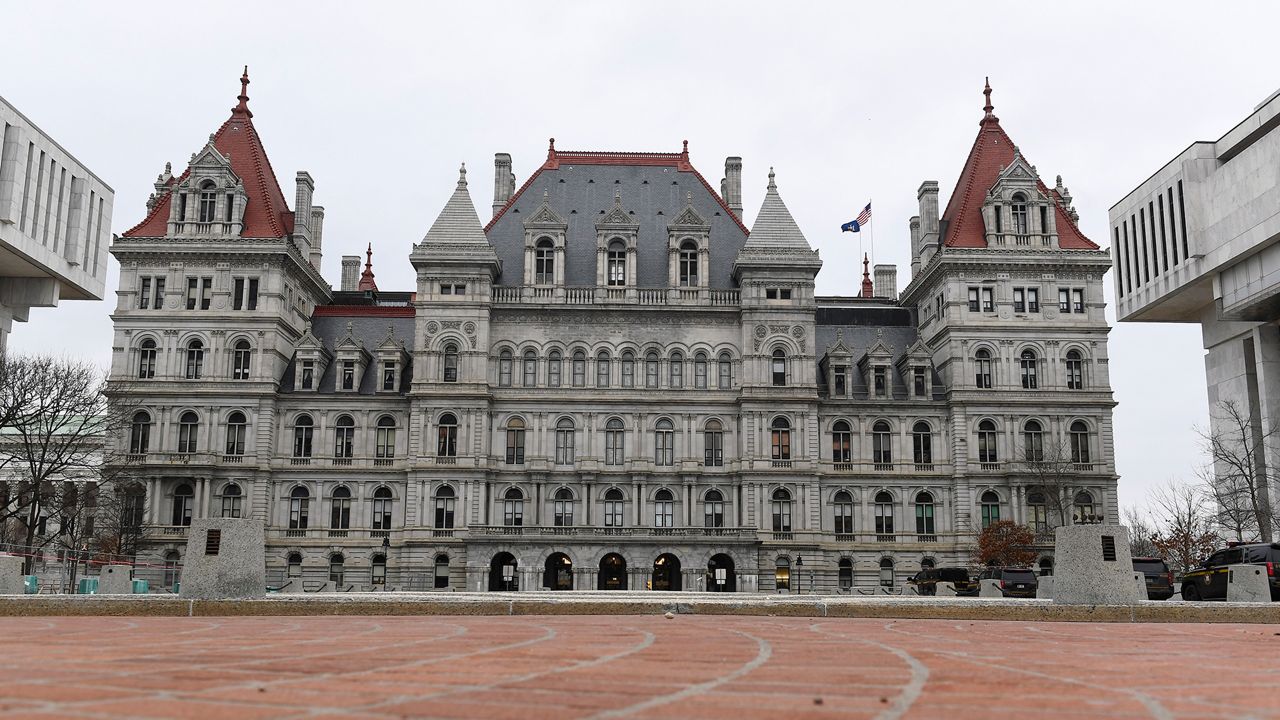In less than a month, Gov. Kathy Hochul will unveil her 2022 agenda in her first State of the State. It's a chance for Hochul to formally assert her own administration's priorities before state lawmakers, and give New Yorkers a roadmap for how she intends to govern.
There are a lot of variables facing Hochul and the members of the state Legislature heading into 2022: All 213 seats in the state Senate and Assembly are up for election, the COVID-19 pandemic has continued to press on with a spike in hospitalizations and cases, while redistricting could upend many careers and plans. Here are five issues that could dominate Albany in 2022:
1. The ongoing pandemic.
March will mark two years since the pandemic formally began, leading to tens of thousands of deaths in New York and economic devastation along with it. Hochul does not have the same powers as her predecessor, former Gov. Andrew Cuomo, to respond to the crisis. At the same time, she's facing pressure at the moment to put mask requirements in place statewide as COVID cases climb and the new omicron variant has reenwed the uncertatiny surrounding the pandemic.
Nearly every issue for New Yorkers flows from COVID: How schools can continue to function with the promise of keeping kids in classrooms through "test-to-stay" policies, making sure New Yorkers have access to rapid COVID tests, to increasing vaccination and booster shot rates and easing the strain on hospitals, many of which are facing a staffing shortage.
Joblessness continues to be higher than prior to the onset of the crisis, especially in hard-hit areas of the state like New York City, where the hospitality and tourism sectors were badly hit.
2. Affordable housing.
State lawmakers and advocates on Tuesday in Albany called for the passage of a bill that would give tenants facing eviction proceedings a right to counsel. It's just one of several measures lawmakers have called for in recent months meant to bolster the ability for people to stay in their homes.
Lawmakers will likely once again debate a statewide "good cause" eviction propsal next year after local governments have approved similar measures at the municipal level. Broadly speaking, the proposal is meant to cap rent increases and give tenants the right to lease renewal.
A decision looms in the coming weeks, too, has the state's moratorium on evictions for tenants facing a pandemic-related hardship looms. State officials have request more funding from the federal government to help pay rents that are in arrears.
Landlords and property owners, however, have protested the measures, and have challenged the eviction moratorium in court. Republicans have argued the proposals place an unfair burden on smaller property owners, who have also struggled financially during the pandemic.
3. The bail laws.
Perhaps the most polarizing issue facing the Legislature and Hochul, the push to once again revamp New York's bail laws will take shape in the coming months. Republicans and law enforcement officials have decried the measures that largely ended cash bail requirements for some criminal charges, arguing the move is tied to a rise in violent crime, though statistics are yet to show a correlation.
Supporters of cashless bail have pointed to a rise in violent crime nationally, and charge opposiiton -- and media coverage -- of the reforms have led the public to turn against the changes.
A state Division of Criminal Justice study on the issue could provide a better understanding of whether the measures have had any discernable effect on crime in New York.
Still, the issue will almost certainly be swallowed up in politics. Democratic candidate for governor Rep. Tom Suozzi, have said they would embrace changes such as expanding judicial discretion. Such a change is opposed by progressives, who argue it would sustain racism in the criminal justice system.
Republicans in the state Senate have reached out to incoming Mayor-elect Eric Adams in New York City, hoping for a bipartisan ally in the push to change the laws.
4. Government reform.
State government does not have the best reputation with voters -- especially when ethics and laws are breached. The controversies that have faced the ex-governor and the former Cuomo administration and how Albany itself has functioned in the last year could be up for a change.
In the last several weeks, lawmakers and government reformers have focused on Cuomo's alleged self-dealing through the use of government resources to help him write a lucrative book and the opaque structure of the state's ethics watchdog entity -- both of which could be addressed legislatively.
Hochul has pledged an overhaul of the Joint Commission on Public Ethics, the little known ethics and lobbying enforcement agency that has come under scrutiny for its handling of the various scandals facing Cuomo (the commission recently rescinded its prior approval of Cuomo's $5.1 million book contract).
Lawmakers may move in the coming months to create a new ethics commission with more independence from the officials it is tasked with regulating. Such a chance could include an agency with judicial appintees on the panel.
5. A new Bills stadium.
How will the state pay for a new stadium for the governor's hometown football team? This isn't really about a Bills stadium as financed by the taxpayer per se, but how Hochul intends to navigate her first budget. About $200 billion in state and federal funding is at stake, lawmakers are eager to bring back fresh victories to their districts ahead of their re-election campaigns and New York is relatively flush with cash thanks to Congress and wealthy taxpayers.
The Bills stadium is just one piece of the budget conversation that will begin in just a few weeks' time.



